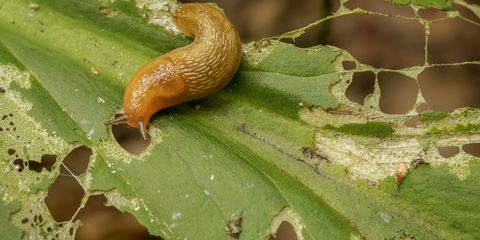Something Keeps Eating My Squash Blossoms In Garden -- What Can I Put On It To Stop This?
As spring creeps closer, we are left wondering how to stop slugs infesting our gardens this year, and how to stop slugs eating our plants.
"Slugs can stay active all year round, unlike snails which go dormant in winter," Hayley Jones, entomologist at the RHS reminds Countryliving.co.uk. "They are cold blooded, so need a certain temperature to function. This means that during any warm spells they will be out and about, and will be ready to go as soon as spring gets going."
STEPS TO TAKE IN WINTER TO PREVENT SLUGS IN SPRING
So, instead of waiting for their preferred warm and damp conditions (aka April showers) to be upon us, is there anything we can do now to take back control and let the slugs know that our gardens are not to be messed with? We asked Hayley...
"The only direct thing you can do to target the slugs at this time of year (January/February) is to turn the soil to expose slugs eggs," Hayley explains. This simply means heading out to your borders with a fork and turning the soil over – which is likely set in place after a few hard frosts – to reveal the fresh ground underneath. This will disturb any slug eggs that have been laid there.
Hayley adds, "You can also search out any hiding places such as under logs and pots and remove the slugs and snails from there."
The only other thing we can do now is be ready for action when spring does arrive. "Have your plan ready!" Hayley insists. "Are you going to go out at night with a torch to collect them? Or do you have the nematode biological control, which can be applied as soon as the soil temperature stays above 5C?"

Danita Delimont Getty Images
STEPS TO TAKE ALL YEAR ROUND
Last year, Springwatch presenter Chris Packham spoke about how he wanted us to do the opposite of prevention and actually encourage slugs into our gardens. His argument was that this, in turn, will attract slug predators into our area who will a) promote a healthy eco-system and b) get rid of the slugs anyway.
And it looks like Hayley agrees...
"A great thing to think about is how you can make your garden more friendly to the natural predators of slugs and snails. Provide food and water for birds, and install a 'hedgehog highway' hole if you don't have one already. A pond is a great wildlife-friendly addition to a garden, and will attract frogs and toads that will help keep your slug numbers down."

2018 SLUG FORECAST
The amount of slugs we see during their most active seasons - spring and autumn - depends on weather conditions. But could our recent bouts of snow and a number of ferocious storms effect them this year?
"A mild winter can mean that slugs will be very prevalent in the subsequent seasons, as they would have been able to continue feeding and breeding and so have a head start for the year. This year, however, we have had some mild spots but some hard frosts too, so it is hard to say what affect that might have," says Hayley.
"The most likely thing to influence their numbers is the temperature and moisture in spring – if it gets hot and dry quickly, they will not do well. Warm and wet is the ideal conditions for slugs and snails to thrive. That means spring is the crucial time, particularly if you have young seedlings."
This content is created and maintained by a third party, and imported onto this page to help users provide their email addresses. You may be able to find more information about this and similar content at piano.io
Something Keeps Eating My Squash Blossoms In Garden -- What Can I Put On It To Stop This?
Source: https://www.countryliving.com/uk/homes-interiors/gardens/advice/a610/slug-infestation-prevention/
Posted by: adornofreeack.blogspot.com

0 Response to "Something Keeps Eating My Squash Blossoms In Garden -- What Can I Put On It To Stop This?"
Post a Comment